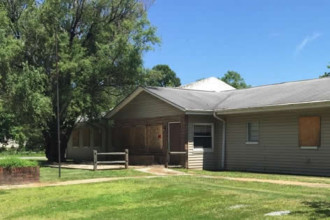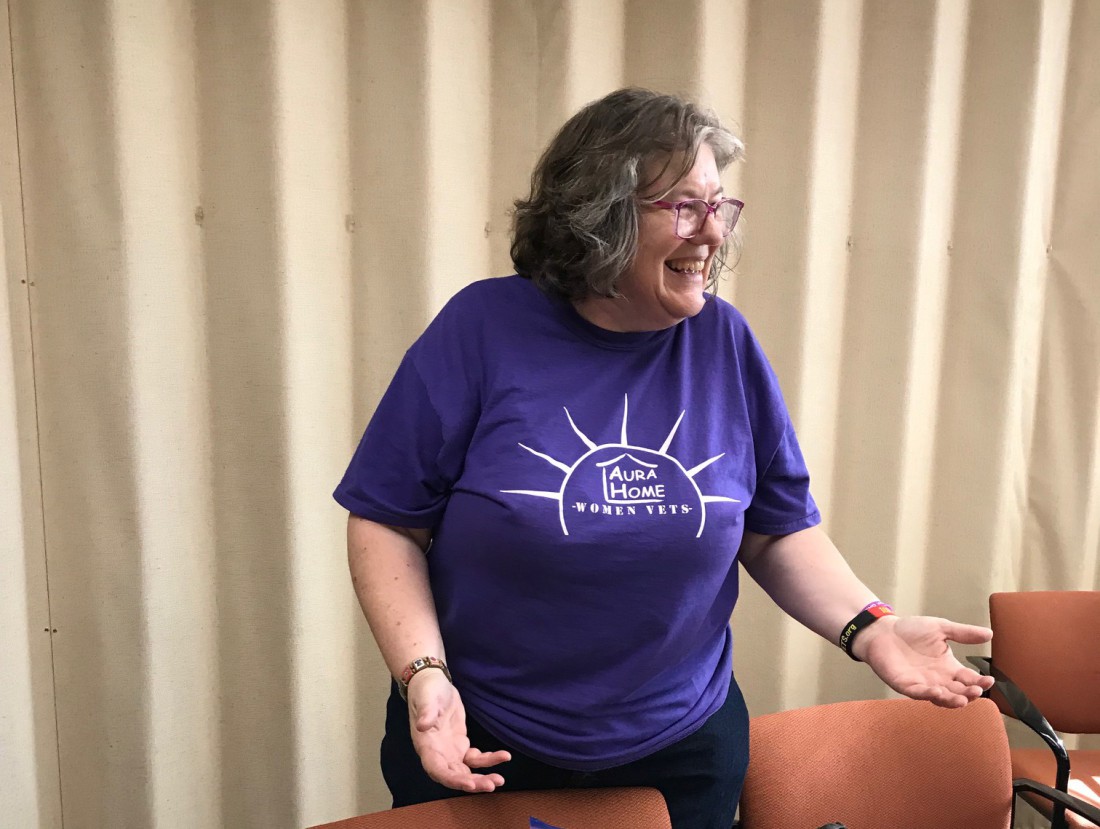Alyce Knaflich knows how to rise up from the ashes and create a new life: She’s done it time and again. Knaflich was homeless for nine years, wandering and wondering where her next meal would be coming from, never knowing for sure where she’d rest her head.
“When you’re homeless, you don’t have time to think about goals and dreams and schemes,” she says. “Every day becomes another battle for simple survival.”
But battling doesn’t scare this military veteran, and these days, Knaflich is dreaming big. In 2009, she began volunteering for causes that mattered to her, particularly helping women, veterans and homeless people. In 2014, she created the Aura Foundation, a nonprofit that serves homeless women veterans in Buncombe, Haywood and Henderson counties. Two years later, the group bought a building on Meadowbrook Terrace in Hendersonville to house the dream: a place women veterans can call home while they find the resources needed to regain independence.
“Everything takes time and money,” Knaflich explains. “It takes time to get approved for disability, and about everybody gets denied at least once. Appeals can take more than a year. It takes time to get set up with long-term housing, to be able to get money together for rent deposits, to get the money for utility deposits. I want a place where women veterans can find peace while they pull their plans together.”
The building’s owners worked with her, and the group was able to purchase the property — a former assisted living facility that had sat vacant for years — for just $10,600. Then, at the closing, the real estate agent handed her a check for $5,000, and Knaflich thought she was on her way. In fact, however, the journey was just beginning. “It’s been a roller coaster ride,” she says now.
Just get it done
The property needs substantial renovations, and a disagreement about how to proceed brought her nonprofit to a temporary halt last fall as several board members quit. Ever the phoenix, though, Knaflich kept going.
“When somebody says I can’t do something, it’s just a bigger challenge to me,” she explains. “I dig in and get it done.” Having determined that the building is repairable, the Aura Foundation’s reconstituted board is now working on getting a design for the renovation.
In the meantime, the organization has established a GoFundMe page (see box, “Next Steps”) and has been holding periodic fundraisers. An Aug. 25 event called the Hawaiian Cowgirl Party drew 96 people and raised $1,356. “We want to have fun raising funds,” notes Knaflich.
Pressing needs
The National Center for Veterans Analysis and Statistics, a program of the Department of Veterans Affairs, estimates that Buncombe County is home to more than 18,000 veterans; some 2,000 of them are women. During this year’s National Point in Time Count on Jan. 31, the Asheville-Buncombe Homeless Initiative counted 554 homeless people, nearly half of whom were veterans.
Homeless women veterans, says Knaflich, tend to be self-reliant, intelligent people with a strong work ethic and a dedication to personal fitness. But posttraumatic stress disorder stemming from such issues as combat, physical assault or other forms of military sexual trauma can wreak havoc with their feeling of being in control, making it even harder for them to ask for help when they need it most. According to the VA’s National Center for PTSD, 1 in 4 women and 1 in 100 men say they’ve experienced sexual trauma in the military.
These experiences can severely undermine a person’s ability to trust. Aura hopes to earn and rebuild that trust. “We’re helping people who’ve served our country,” says Knaflich. “All veterans deserve respect.” To that end, she’s assembled a cadre of dedicated volunteers who are willing to do the heavy lifting, whether it’s cleaning up the building, collecting donations or educating the community.
Betty Sharpless, who began volunteering with Aura three years ago, says, “I have taken over 15 loads of debris to the Hendersonville dump, provided refreshments at the dance benefits, cut grass, mopped floors, worked the booth at [gay pride] events and rounded up clothes for incoming women vets,” many of whom have only the clothes they’re wearing. “Just recently,” continues Sharpless, she “hosted an outdoor music event. I’m looking forward to working my first veteran stand-down.”
Standing up for women vets
During the Vietnam War, a stand-down was a time when troops could get a break from combat, receiving care and enjoying camaraderie. Today, the National Coalition for Homeless Veterans helps organize and publicize these annual events across the country. The Charles George VA Medical Center administers the Asheville Stand Down for Veterans each year in conjunction with many other local entities, including FIRST at Blue Ridge, the Asheville Buncombe Community Christian Ministry, Homeward Bound, the Veterans of Foreign Wars and the American Legion. The next such event will happen Friday, Sept. 7 (see box), providing information about education, housing, legal resources, health care, mental health options and more. Eligible veterans who are homeless or at risk of becoming homeless may also receive services such as meals, haircuts and medical screenings at the event.
Still, that doesn’t begin to address the needs. “There’s not enough for homeless women veterans,” says Aura board member Deb Love. “Some of them don’t realize they qualify for benefits. We help them get self-supporting.”

Aura’s work isn’t limited to the proposed shelter facility, however. One homeless woman was given a donated trailer in poor condition, and Aura raised funds to replace the floor and subfloor and make it habitable. The organization also has a three-bedroom apartment in Asheville that temporarily houses women veterans while they work on putting together a longer-term situation.
“We step in and help, donating time, energy and money,” Love explains. “We all have overcome our own obstacles.”
In addition, Aura helps homeless women veterans connect with resources available through the Department of Veterans Affairs and community groups. The VA has traditionally placed homeless women veterans in Steadfast House, a transitional housing facility that also serves women who aren’t veterans. But being in a general population isn’t always the best option for coordinating veteran resources and rebuilding shattered self-confidence, says Knaflich.
Still, the goal is always “to give women a hand up, not a handout, so they can give back once they’re better,” notes Love.






Before you comment
The comments section is here to provide a platform for civil dialogue on the issues we face together as a local community. Xpress is committed to offering this platform for all voices, but when the tone of the discussion gets nasty or strays off topic, we believe many people choose not to participate. Xpress editors are determined to moderate comments to ensure a constructive interchange is maintained. All comments judged not to be in keeping with the spirit of civil discourse will be removed and repeat violators will be banned. See here for our terms of service. Thank you for being part of this effort to promote respectful discussion.